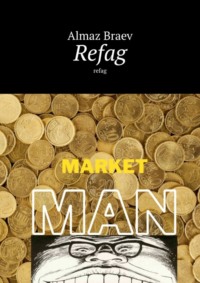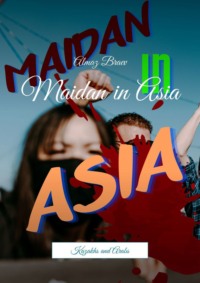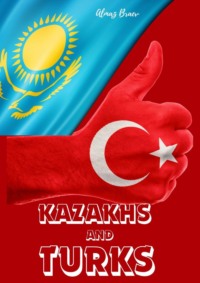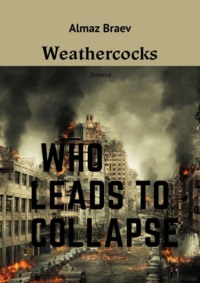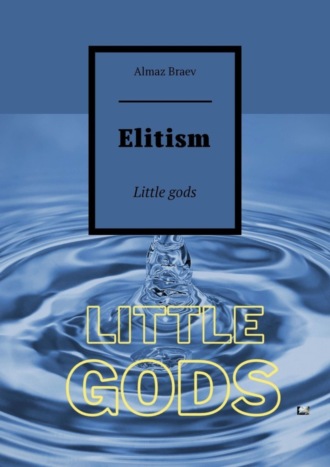
Полная версия
Elitism. Little gods

Elitism
Little gods
Almaz Braev
© Almaz Braev, 2021
ISBN 978-5-0053-5374-0
Создано в интеллектуальной издательской системе Ridero
Dedicated to the memory of my father
Introduction
Chapter I. You can’t fool nature
Chapter II Why didn’t they colonize Jupiter?
Chapter III If the president rules for 30 years
Chapter IV Nomads have no nationalism
Chapter V Intermittent and a full circuit
Chapter VI Sargun
Chapter VII Chauvinism
Chapter VIII Two egalitarian ideas
Chapter IX The nationalism of the periphery
Chapter X The bastards
Chapter XI How nationalism defends and attacks
Chapter XII Pan-Turkism. Yesterday and today
Chapter XIII Iranian nationalism
Chapter XIV Rough mode and escape» brains»
Chapter XV Cultural (everyday) chauvinism-the enemy of the empire
Chapter XVI Japanese nationalism
Chapter XVII What to do?
Chapter XVIII The Zerefs are not nationalists.
Chapter XIX Nationalism or shopping.
Chapter XX A pleasant nationalism for everyone
Glossary
Introduction
Everything is decided today not by presidents, not by autocrats, not by dictators, but by money. People don’t think they have the flu, but they do care about their health. Because today, every person is God. Everyone thinks they are God because they have money. No one recognizes any authority. Because the elite has disappeared. Today, the elite is the oligarchs. Nationalism is the first egalitarian idea, to people dream of being oligarchs and stop respecting real nobility. How to get back the lost elite?
The emergence of nationalism is associated with the modern era. When the super transformation of the human mass began to take place intoxicated of technological progress.
However, this is just a one-sided explanation, suffering from unclear motives. Why suddenly people began to change massively intoxicated of rapidly changing conditions? Maybe technical progress has come to every rural house, to every traditional family?
Naturally, modernism did not come to every family in the form of Santa Claus or another kind of fairy-tale characters, and the technological progress actually caused a vague optimism of the Zerefs.
As is usually the case, people feel good and happy with their life.
It is difficult to imagine the technical revolution as good and happy for dark people. However, like a new grain crop or a tractor, all future abundance is perceived by people very cautiously. The great Russian reformer Peter the Great, for example, could not force the peasants to plant potatoes imported from Holland. When he was studying in Europe, he liked mashed potatoes. The dark Russian peasants found the round Indian rhizomes poisonous. As always, as everywhere, everything new always seems harmful. This is a natural human distrust.
And then Peter the Great went to the trick. He put a guard on the potato fields.
Everything stolen is delicious!
It was only by stealing and tasting the Indian tubers that the Russian peasants learned to plant potatoes.
The same problems were with tractors and other technical inventions.
At the beginning of the XIX century, the Luddite movement appeared in England. The workers destroyed the looms that produced many stockings. According to the rebels, these machines took away the work of private knitters. This resistance was suppressed only by the army. Many workers who rebelled were executed.
Discretion is the better part of valor. The country people are great little conservatives. They did not understand that technological progress and its influence are not subject to a crude mind and a pair of ordinary human eyes. Any technical perfection creates new opportunities. It is not clear how this happens, but traditional families immediately grew up with new children. Any invention, in any field and in any industry, in the form of a new organization of labor, the new machine, a new cure for a pandemic, creates a relief of life. And once there is a relief, then there are opportunities. More young people are starting families and having children.
In nature, the same. If nature is benevolent: the sun shines, the rains come on time and irrigate the fields, the cold does not kill the crops, then the people will prosper. After a while, the number of people will increase. Conversely, if there is bad weather, cold, and hunger, men will be sullen, women will be quarrelsome. If there is no food, then there will be no children. Tribal nomads from bad weather, unfavorable climatic conditions began to push their neighbors are the same nomads. These exiled tribes of nomads in the IV century reached Europe. This process of pushing each other’s nomads to the west is called later the Great Migration of Peoples. From the onslaught of the barbarians, the Roman Empire fell.
Nomads differ from farmers only in that modernization or modernism occurred much later. This modernization of the traditional way of life among the descendants of nomads is happening only today.
One thing you need to learn from the very beginning. Traditional people, in revcon system these are Zerefs, Zerots, Zeremids, are very conservative in everything. Each group of reflection separately and if you look at all the groups together. The tradition is characterized by almost absolute conservatism. All traditional people adapt to changes and depend on their reflection. For traditional people, it is essential to maintain their place, their rank, their caste in the community. Therefore, they have always done and will always do so to stand out, to take a place of honor. If they are Zerefs and Zeremids, then these categories of reflection want to turn into a new elite. If it’s the Zerots or the traditional aristocracy, they don’t let anyone into their elite circle.
Only intoxicated of the elements, disaster, attack, crisis, war, revolution, Maidan, the traditional elite gives way to the new traditional elite. The King is dead! Long live the king! The dragon will always live in such an environment.
Therefore, today the most likely scenario is the desire of the mass, the traditional mass of people to become an elite, thanks to the market, thanks to money. Once again, the elite stands out from the traditional mass, but the new people in the government do not look like Democrats in any way. These are the same traditional Zerefs and Zeremids that create new corruption links.
Such Zerefs and Zeremids do not recognize anyone except for yourself and your relatives. They were supposed to love others, but they forgot everything. They have no authority but have power. Furthermore, they themselves want to become authorities, to have power. The peripheral regions of the planet are not to blame for the fact that they are just entering the total era of modernism and at the same time post-modernism. This book is intended to somehow control this process.
In the twentieth century, two trends and two ideas «conceived by geniuses» turned into disgust. The material came first. Talent and nobility come second. It is the destruction of nobility that is the prerequisite for the bankruptcy of all ideas, except for the ideas of freedom and democracy. Social networks are a mechanism for collecting suffering little envious self-esteem. They shout No talent! Not, to nobility! Only equality. This book describes the birth of the first egalitarian idea – nationalism.
Chapter I
You can’t fool nature
Tunisia.
At the beginning of the tenth year of the XXI century, a series of popular outrages, revolutions, resignations, coups called the «Arab Spring» began in the Maghreb countries.
From what hibernation did the northern and western Arabs wake up?
Let’s take it in order.
It all started with the self-immolation of Arab unemployed in Tunisia. WikiLeaks also reported on the Internet about total corruption, which embittered the population. The self-immolation was only an excuse for a riot. In addition to the second Jasmine Revolution, this revolution was called the «WikiLeaks revolution». That is, the influence of social networks and high technologies has passed the first political run-in.
President Ben Ali, who ruled the country for 23 years, fled Tunisia for Saudi Arabia.
How so? The president seems to be a democratically elected person and has ruled the country for 23 years. There is nothing surprising. Before Ben Ali, the same president was his predecessor Habib Bourguiba. This former French lawyer, who also seems to have been brought up on European values, ruled the country for 30 years and the formal reason for his removal from power in 1987 (the first Jasmine Revolution) was his old age. Both Bourguiba and Ben Ali placed their men in government posts throughout their reigns.
You can’t fool nature.
You can proclaim your commitment to European values and talk about your love for democracy as much as you want, but in fact, you can place your relatives everywhere in government posts. Such a system is indeed viable because it is still the same traditional autocracy. Of all the African countries on the coast, Tunisia had the highest education rates. However, this did not stop the people. The people united the Internet. The influence of the Internet is like a divine leader. This leader is not really there, but he is there. It is there because someone has ignited the hearts of Tunisians with anger. They were outraged by the corruption in the Ben Ali administration.
And why are they outraged by corruption?
Tunisians have not only become physically numerous (zeref’s loop). Most of the Tunisian intelligentsia studied in Europe. The Arab soul and European values (knowledge) gave the jasmine god-the invisible leader (the remid’s loop).
What do we have in the end?
Any revolt has several nodes of contradictions.
We answer these questions with the revcon.
The reasons for the second Jasmine Revolution in Tunisia are:
1. Modernization. Industrialization in the Western manner after the declaration of independence. If innovations come to the traditional environment, they stimulate sharp childbearing of the population. It is Zeref’s loop.
2. Modernization. Education. Mass education of the population begins because a complex economy needs educated professionals. The government seeks to get rid of the dependence of the metropolis and white professionals. The new states always need our staff of specialists. It is Remid’s loop. And the Remids are always ambitious and intolerant of the facts of injustice.
3. You can talk a hundred, a thousand times about democracy and civil law, in fact, everything is the opposite. This is evidence that there is a large traditional population, while there are few professionals and intellectuals. If the Zerefs are many, they have many children, Remids are few, they are not even Remids yet, but Zeremids, and Zeremids have inferiority complexes and behave like servants at the right moment. Therefore, the ethics of submission always leads to corruption. The traditional population can sing publicly about anything, but it remains the traditional population. The traditional population needs a sultan, an autocrat, a dictator. It’s more convenient for them. This is the zeremid’s loop.
4. The traditional world as usual is divided into castes. All official figures in public are hypocritical and wear European tailcoats. It also doesn’t change anything. Strangers people why outside the main clan are not allowed to cash flows and positions. Total corruption will result. I repeat once again: this traditional scheme is convenient for the people. Unless, of course, there were provocateurs from outside (as WikiLeaks). When strangers are not allowed to join the ranks of the current main clan, this is a zerot’s loop.
It’s the same story in Libya and Egypt.
Hosni Mubarak ruled for 30 years, Muammar Gaddafi ruled for 40 years. Both dictators called themselves by different names and referred to themselves as belonging to different political camps. Colonel Gaddafi was a popular socialist. Mubarak was based on the values of Western democracy.
Chapter II
Why didn’t they colonize Jupiter?
Few people think about the meaning of life. In a conservative world, everyone seems to have no room for selfishness at all. This is understandable. Either a well-fed person or a noble person thinks about the meaning of life, and a person from the elite is a priori a well-fed person. It is not proper for an aristocrat to be hungry, otherwise what kind of aristocrat is? Poverty and hunger make a person insignificant and dependent (dependent on the collective of relatives in the first place. And so on). This dependence eventually turns into the duty of everyone born in a traditional team, and this duty is one of the innate habits. (Today, this debt is called a debt to the Motherland and Motherland is the same group of people that the hero does not know, but he knows that there is a Homeland)
Therefore, it is not necessary to teach all traditional peoples heroism. They have been fighting each other for thousands of years. All the peoples of the world still need heroes. Although modern heroes are called differently today. But this does not interfere with our conclusions.
Traditional people are born for war.
All traditional people were born to fight, or to be more precise, to survive. The struggle can also be with nature itself. But the struggle for survival and survival does not exclude the war of the Zerefs with each other. After all, the man himself is the most important part of nature. At least, that’s what he decided. Although in nature, the struggle of species did not stop for a moment without human intervention. This struggle of species means that it is still going on.
But how does a person fight? Who is he still fighting with nature or with yourself? With both.
Although the struggle of the peoples took a variety of forms it is important for us to find out how the mass struggle, or war, or the tradition of war, survived its wild time and what form it took at the moment. We are already used to it, and we are taught that only savage people engage in bloody battles, and modern people do not. Modern people are so tolerant of each other, so tolerant, so cute. There is no war (and there is one). There is no nationalism (but there is one). There are no conspiracies of financiers (there is a contract).
So.
Are people really tolerant of each other?
Where did the heroic traditions disappear? How have the traditions changed in general? After all, according to the law of conservation of energy, nothing disappears anywhere, but only changes its shape.
Once we started this conversation with the Arab Spring.
We need to be clear. Or explain. Or just reassure ourselves that we know something. We just know something. We just know the facts, but it’s hard to make a system. But who finds it difficult?
And since we know something, we will also draw our own quick conclusions.
Moreover, we have a new method – revcon.
There is such a concept in the world practice as modernization.
What do we know about modernization?
Modernization is understood as the process of transition of traditional collectives, communities, and peoples to another state, to the state of modernity. The state of modernity is understood as industrialization, urbanization, cultural and mental mass rebirth of people.
Traditional people intoxicated of technological progress change their attitude to the world.
I agree. They change it.
But how they change it. What do they understand? What do they forget? What do they remember?
Do the former Zerefs have no memory at all or do they all get blood transfusions? To the point where they forget who their kin are?
No way. They don’t forget. They remember.
Maybe they cease to be courageous people at least in their hearts? To the point that in the first urban generation they are a little rude, primitive cunning, excessively greedy, and at the same time patriotic?
Yes, it is. The tradition of capture, plunder, war, in general, any past historical rudeness, cannot immediately disappear. But it is now past feudal qualities that are rude. For feudalism, all means are good to obtain material goods in any way. But first, need the fame, then rank, then cast.
Today, observing how in former republics (namely former socialist republics, not past monarchies!) nepotism, tribalism, corruption have flourished, and this is although the same modernization and urbanization was carried out in the former republics, what can say?
We can say that the technological revolution, the construction of cities, mass education were important for the mass rebirth of the local population. All the local peoples have changed a lot. Mass education cannot fail to change the quality of a person.
However, what each individual person remembers, as well as every traditional people, could not disappear in time. The political form, and in our case socialism, was important so that the peoples did not immediately wake up the old memory. And the Soviet education and the remnants of culture are still working, working so that the awakened reflexes do not absorb all the peoples back to the old time.
We will be interested in the question again and again.
To what extent can modernization (technological revolution, urbanization, education) change mass reflection? It is reflection. Because there are no other ways to explain the massive conservative revival after the collapse of empires but only through mass reflection.
It is to understand the situation that the facts of the Arab Spring will be used.
Why the Arab Spring?
Yes, because before European modernization, the countries of the Near and Middle East were the cradles of an ancient civilization.
So ancient that judging by the degree of influence of urban culture and culture in general, the descendants of Sumerians, Assyria, Babylon the Arabs should have already colonized Jupiter. What do they do now? What is a paradox?
Chapter III
If the president rules for 30 years
If you look at the map of the Arab Maydans, you can immediately see that the Maydans did not expand the borders of the Arab Caliphate, but exactly fit in the old place. We can safely say that the Arab Spring of 2011 is the spring of the Arabs.
But who are these revolutionaries?
Why did they rebel against the traditional order? After all, the peoples of the past Arab Caliphate are very conservative: the elites are very revered, the peoples are obedient to them.
Of course, you can immediately put the Maidan and the Ottoman Empire on the map. But it won’t be the same.
First, because the Arab spring was attended by Arabs, not the South Slavs, and even more so, not the Turks but only the Arabs. Therefore, we will consider this speech more Arabic and less religious. Religious strife based on different trends of Islam have always been, since the time of the fourth righteous Caliph. The influence of religious intolerance is still not the most important thing in Arab nationalism, although the religious component is less important (At least from the point of view of over-conservatism. Why didn’t the Arabs colonize, say, Mars, or get ahead of Europe in creating the internal combustion engine?), it also explains a lot.
How did it all start?
It all started with the fact that the Arabs were nomads of the Arabian Peninsula. That explains a lot. Many things explain, but not all.
They would have remained in the old place, even if the future colonizers, and we mean those Europeans who brought modernization to these places and, perhaps, would have presented us with an Arab version of pure bourgeois nationalism. However, the founder of the new faith, the Prophet Muhammad (peace and blessings of Allah be upon him), was born in Mecca. And after the preaching of the Prophet (peace and blessings of Allah be upon him), the Arabs turned from local nomads of the aborigines into nomads of proselytes, spreading the faith among other peoples with the sword and preaching. So, they would have stayed in place and lived no less well.
Thus, the Arabs could not have turned into nationalists either in the XIX century or in the XX century, when modernization took place among the Europeans. To complete this, they did not just have a material base. There was gold, there were material values, there were troops, talented generals, great scientists in the east, but the main material principle was not there.
First, it means that the traditional Muslim people did not welcome the trade business like all nomads. Caliphs, sultans, viziers knew only about the benefits of trade, so they tried to protect the caravaneers and merchants represented by different peoples from violence and plunder, but the trade itself was not welcomed. First, nomads have always been warriors. And where there is a military caste, there is always a traditional hierarchy. Secondly, the Koran did not welcome loan interest (how it practiced the ancient Jews). Giving money at interest and taking money at interest is a grave sin.
Now you can just look at the late leaders of the Arab countries during the modernization period and draw some conclusions:
Tunisia.
First President Habib Bourguiba. He ruled for 30 years. He left the post under the pressure of protests and old age. Furthermore, he was replaced by Ben Ali. Ben Ali ruled for 24 years. But in January 2011, riots broke out in Tunisia. Like Bourguiba, Tunisia’s new leader, Ben Ali, has been re-elected several times and extended his term through referendums. For twos, three decades, all the dictators in the East quickly turned state power into a personal feeder and the feeder of their clan. Another big minus to the same: Ben Ali was henpecked. Everyone saw and believed that the country was ruled by a woman. The second wife and her ten brothers were hated.
As already mentioned, Tunisia has the highest educational level in Africa. High development indicators. The government raised only the price of bread and everyone was immediately outraged by the regime. The market jobless merchant committed self-incineration. One thing overlapped with the other and there was an explosion that caused a domino effect throughout the Arab world.
But, once again! The Tunisians hated his wife. In a Muslim country, provided with the Internet, this turned out to be the main fuse of the Tunisian Maidan. Before that, there was a rumor that Leila Trabelsi was going to become president. And this would be outraged by any traditional people, not just Tunisians. Although Tunisia has been modernized, urbanized, and so on. And what is the effect of this? Nothing. And this is although the Tunisian elite is partially Europeanized. French influence is traditional. Ben Ali himself studied at Saint-Cyr.
Egypt.
Now fast-forward to the centuries-old administrative and spiritual center of Islam, to the capital of Egypt – Cairo.
Egypt remained a landmark for the Arab world, not just an administrative legacy. After independence, Egypt was one of the first to break free from colonial dependence (1922), although it lacked the physical strength for real independence. Yet, the Republican officers were among the first to overthrow King Farouk (1952) in Egypt. The same Libyan captain, Muammar Gaddafi, carried out a coup only in 1969 because Libya, next to his brisk neighbors, has always been backward. Most of the territory is the Sahara Desert. The officers of the Arab countries took an example from the Egyptian passionary charismatic Abdel Nasser.
After the assassination attempt and the death of an associate of Nasser Anwar Sadat, Hosni Mubarak was president for 30 years (after all, such a sweet power in the east!). From Nasser to Mubarak, Egypt underwent modernization, developed industry, and raised the educational and cultural level of Egyptians. However, if we talk about urbanization and urbanization did not have time to «absorb» new streams of babies being born. Egypt had the highest fertility, with almost 4 babies per woman. The population growth was very high. The population of Egypt is 100 million. And all the people fit along the river and the Nile Delta. High density! By 2011, 2 million Western students had returned home from Europe. One of them just repeated the self-immolation action, which served as a reason for a social explosion. The words about corruption, poverty, and dictatorship were repeated. How it is everywhere the same and familiar.


